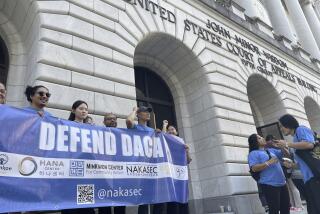Judge Refuses to Dismiss Civil Rights Suit by âL.A. 8â
A Los Angeles federal judge handed the Justice Department another major setback Monday in its decade-long campaign to deport a group of Southern California immigrants, who the government says have ties to Palestinian terrorists.
U.S. District Judge Stephen V. Wilson rejected the Justice Departmentâs contention that he should dismiss a major civil rights case filed by the immigrants, seven Palestinians and a Kenyan known as âthe L.A. 8.â The immigrants say they have been selectively prosecuted for lawfully exercising their 1st Amendment rights in assisting the Popular Front for the Libertarian of Palestine in humanitarian activities.
Wilsonâs ruling was the first issued by a federal judge on a key section of the Illegal Immigration Reform and Immigrant Responsibility Act of 1996.
âI feel great,â said Michel Shehadeh of Stanton, one of the plaintiffs and the West Coast regional director of the American-Arab Anti-Discrimination Committee. âWeâve always said this is a test case. The governmentâs actions are politically motivated and they have no merit whatsoever,â said Shehadeh, who has lived in the United States since 1975 and had applied for citizenship just 11 days before the government took action against him in 1987.
âIâm really relieved,â said plaintiff Khader Hamide of Chino Hills. âNow we can proceed with the selective prosecution case,â said Hamide, who has lived in the United States since 1971 and also had applied for citizenship just before the case began.
If Wilson had ruled in favor of the government, it would have paved the way for the Immigration and Naturalization Service to reinstate deportation proceedings against the immigrants--proceedings that Wilson and a federal appeals court halted earlier.
The case started in 1987 when the government launched deportation proceedings against âthe L.A. 8,â precipitating their suit contending that the government was violating their civil rights.
At that time, the government contended the plaintiffs, as aliens, did not have the same 1st Amendment rights as citizens and that their association with the PFLP made them deportable even though citizens could not be arrested for the same conduct. But both Wilson and the U.S. 9th Circuit Court of Appeals rejected that argument, ruling that resident aliens have the same 1st Amendment rights as citizens.
Last year, Wilson, a 1985 Reagan appointee, ruled that the immigrants had made a prima facie showing that the government was selectively enforcing U.S. immigration laws against them. The judge noted that 10,000 pages of material submitted by the government confirmed that the plaintiffs had done nothing illegal.
In a sweeping November 1995 decision, the 9th Circuit stressed that under Supreme Court precedents âguilt by associationâ violates the 1st Amendment. The appeals court said the government had failed to show that the immigrants had a âspecific intentâ to further any illegal aims of the PFLP, a militant wing of the Palestine Liberation Organization. The appeals court ruled that deportation proceedings had to be halted in order to prevent âirreparable injuryâ to the plaintiffsâ constitutional rights of freedom of association.
A month ago, however, Justice filed papers contending that the 1996 immigration law deprives federal trial courts of jurisdiction over any challenge to the commencement of deportation proceedings and therefore the selective prosecution case should be dismissed. The immigrantsâ lawyers, headed by David Cole of the Center for Constitutional Rights and Marc Van Der Hout of the National Lawyers Guild, vigorously disagreed, setting the stage for Mondayâs hearing.
âAt issue here is nothing less than federal judiciaryâs ability to meaningfully review unconstitutional executive action and protect against ongoing irreparable injury to 1st Amendment rights,â the plaintiffs lawyers said in their brief.
On Monday, Deputy Assistant Atty. Gen. Philip D. Bartz contended in court that Congress clearly intended in the new law to reduce the authority of federal judges in immigration matters. He said that a federal appeals court could consider an appeal if an administrative law judge issued a deportation order.
But Wilson agreed with Cole that the plaintiffs were entitled to have their selective prosecution claims heard before any deportation proceeding is held because their challenge is based on 1st Amendment rights, giving it higher priority than other sorts of claims.
Wilson also agreed with Coleâs assertion that if the governmentâs position prevailed it would âclose the doorâ to any meaningful appeal of a deportation order in this case. Wilson stressed that federal appellate courts can only consider appeals in deportation cases based on what was presented to the administrative law judge. Because those judges cannot consider any constitutional issues, the Justice Departmentâs argument that the immigrants would be able to appeal on constitutional grounds is a âfiction,â Wilson said after a 90-minute hearing.
More to Read
Sign up for Essential California
The most important California stories and recommendations in your inbox every morning.
You may occasionally receive promotional content from the Los Angeles Times.










